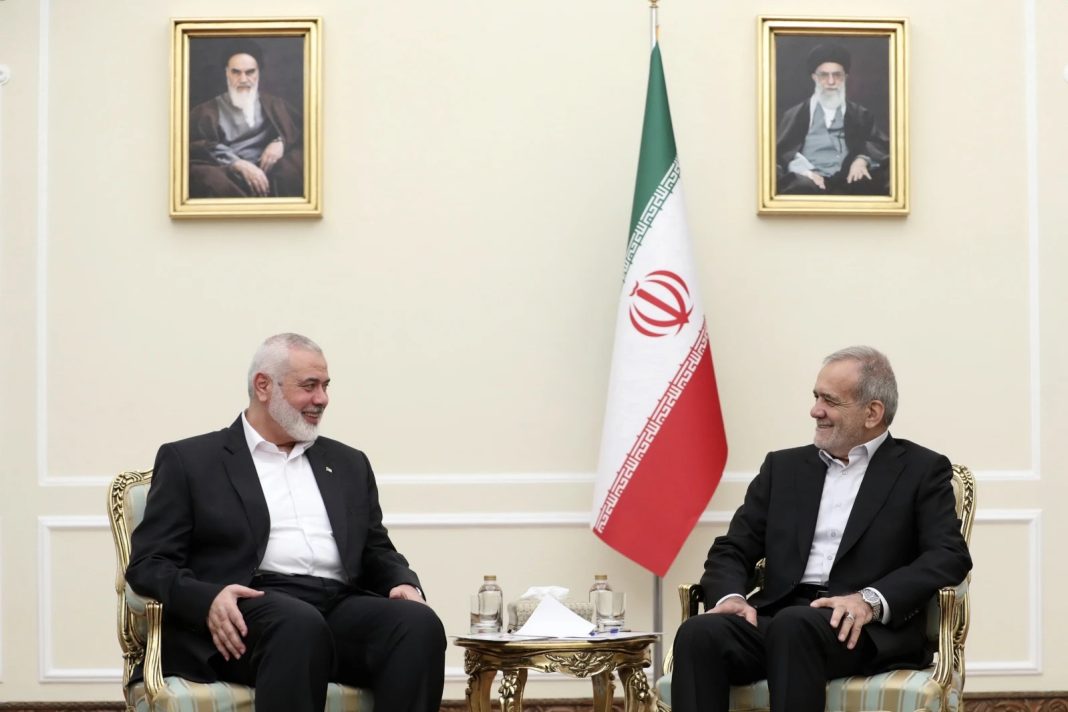TEHRAN, Iran — In a dramatic escalation that threatens to ignite a wider regional conflict, Hamas’ top political leader, Ismail Haniyeh, was killed early Wednesday, July 31, 2024, in a predawn airstrike in Tehran, both Iranian authorities and the militant group confirmed.
The strike, which has been attributed to Israel, comes amidst already high tensions following an October attack on southern Israel by Hamas.
Iran’s supreme leader, Ayatollah Ali Khamenei, vowed revenge, declaring that Israel had “prepared a harsh punishment for itself” by killing “a dear guest in our home.”
Haniyeh’s assassination is poised to have profound repercussions, given the sensitive nature of the operation carried out on Iranian soil.
Most worrisome is the potential for this incident to push Iran and Israel into direct confrontation.
The U.S. and other nations are now urgently working to prevent the conflict from escalating further.
The Israeli government, which has maintained silence on the strike, had previously pledged to eliminate Haniyeh and other Hamas leaders in retaliation for the group’s Oct. 7 attack that marked the onset of the current Gaza war.
The attack on Haniyeh occurred shortly after he attended the inauguration of Iran’s new president, Masoud Pezeshkian, in Tehran, and just hours after Israel targeted a top Hezbollah commander in Beirut.
In a statement on his official website, Khamenei emphasised that revenge was “our duty.”
The killing of Haniyeh comes at a precarious time, with U.S. mediators reporting progress in negotiations for a cease-fire and hostage release in the ongoing Gaza conflict.
Haniyeh’s death could derail these talks and heighten tensions between Israel and Hezbollah.
Israel carried out another significant strike Tuesday evening in Beirut, targeting a top Hezbollah commander, Fouad Shukur, allegedly behind a recent rocket attack on the Golan Heights that killed 12 people.
Hezbollah, which denied involvement in the Golan attack, reported that Shukur’s body was being searched for in the rubble, with the Lebanese Health Ministry confirming the deaths of three women and two children in the strike.
The White House has yet to issue a response to Haniyeh’s assassination. U.S. Secretary of State Antony Blinken stated, “This is something we were not aware of or involved in,” when asked about the incident, refraining from speculating on its impact on cease-fire efforts.
U.S. Secretary of Defense Lloyd Austin, meanwhile, expressed hope for a diplomatic resolution on the Israeli-Lebanon border, stating, “I don’t think that war is inevitable.”
International diplomats have expressed grave concern.
A Western diplomat, speaking anonymously, warned that the strikes in Beirut and Tehran have “almost killed” hopes for a Gaza cease-fire and could push the Middle East into a “devastating regional war.”
Israeli officials, including Defense Minister Yoav Gallant, have remained largely silent on the Haniyeh killing. Gallant stated that Israel is preparing for all possibilities, emphasising that it does not seek war but is ready to respond as necessary.
The killing of Haniyeh, who had lived in exile in Qatar since 2019, is seen as a highly sensitive move.
Israel has previously targeted Hamas figures in Lebanon and Syria but taking action against Haniyeh in Iran adds a new dimension to the conflict.
Israel is suspected of a longstanding assassination campaign against Iranian nuclear scientists, including the 2020 killing of top Iranian military nuclear scientist Mohsen Fakhrizadeh.
During Haniyeh’s final hours, he was seen attending President Pezeshkian’s inauguration, smiling and clapping alongside leaders from the Palestinian Islamic Jihad militant group and Hezbollah.
Hours later, a missile strike hit Haniyeh’s Tehran residence, killing him and one of his bodyguards, according to Iranian officials.
Iran’s Revolutionary Guard has promised a “harsh and painful response” from Iran and its allies.
The assassination of Haniyeh is expected to complicate efforts for a cease-fire and could lead to increased hostilities from the “Axis of Resistance,” a coalition of Iranian-backed groups including Hezbollah, Hamas, and militias in Iraq, Syria, and Yemen.
In related developments, a U.S. airstrike southwest of Baghdad killed four members of the Iranian-backed militia Kataib Hezbollah, which has targeted U.S. bases.
A U.S. defense official confirmed that the strike was a defensive measure against combatants posing a threat to U.S. and coalition forces.







